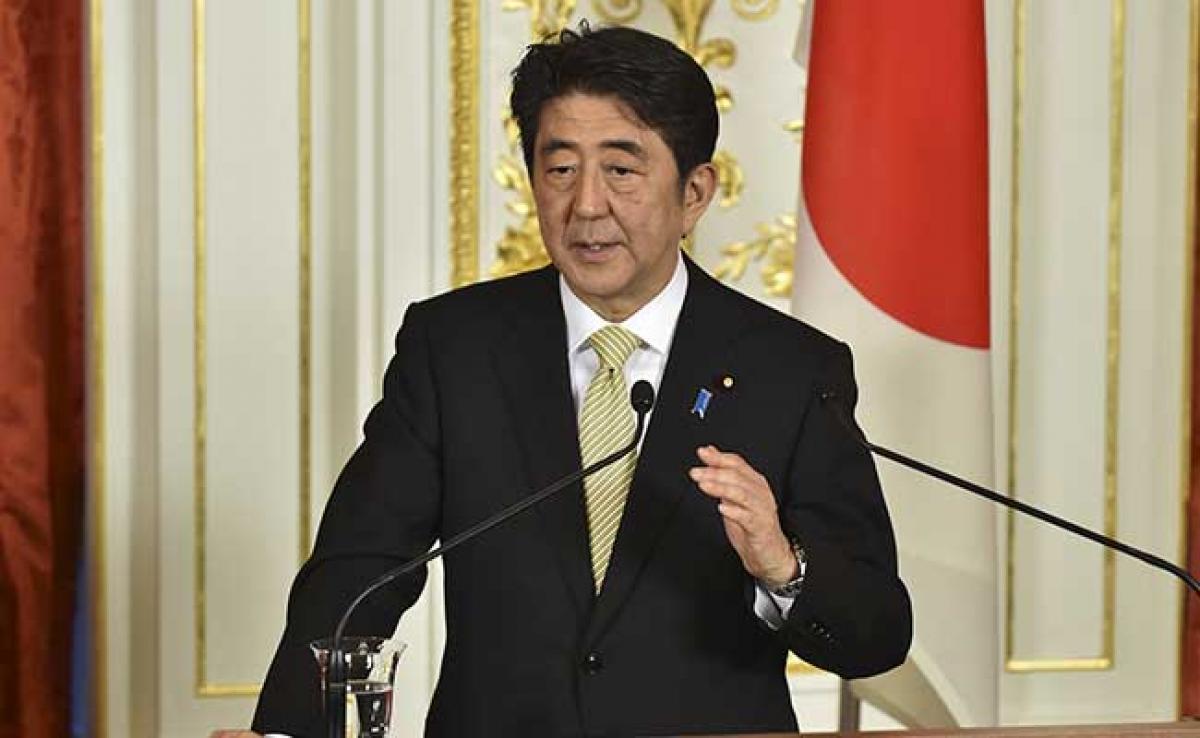Live
- Ramanavami celebrated with stunning classical dance
- UP govt prepares question banks for students
- Educating youth about importance of maintaining a healthy liver
- Nine candidates enter the poll fray on first day
- IIT-K, BFI forge partnership to accelerate healthcare innovation
- Nurture self-confidence and growth
- Nominations filed for Kurnool & Nandyal constituencies
- YSRCP’s ‘poor’ candidate owns assets of Rs 161 crore
- 12 nominations filed on Day-1
- Infy profit zooms 30% to ₹ 7,969cr in Q4
Just In

x
Highlights
Prime Minister Shinzo Abe on Friday will make a statement just ahead of the 70th anniversary of the end of World War II.
Prime Minister Shinzo Abe on Friday will make a statement just ahead of the 70th anniversary of the end of World War II.

His remarks will be closely watched by Asian neighbours China and South Korea, which suffered from Tokyo's 20th century militarism. They warn any watering down of previous statements with explicit apologies would jeopardise diplomatic ties.
Abe, an unabashed nationalist, has been criticised by some for playing down Japan's war record.
Here are some previous remarks by top Japanese officials concerning past aggression and Tokyo's formalised system of sex slavery in military brothels.
Murayama statement in 1995
In 1995, then-prime minister Tomiichi Murayama said on the 50th anniversary of the war's end: "During a certain period in the not too distant past, Japan, following a mistaken national policy, advanced along the road to war, only to ensnare the Japanese people in a fateful crisis, and, through its colonial rule and aggression, caused tremendous damage and suffering to the people of many countries, particularly to those of Asian nations.
"In the hope that no such mistake be made in the future, I regard, in a spirit of humility, these irrefutable facts of history, and express here once again my feelings of deep remorse and state my heartfelt apology.
"Allow me also to express my feelings of profound mourning for all victims, both at home and abroad, of that history.
"Building from our deep remorse on this occasion of the 50th anniversary of the end of the war, Japan must eliminate self-righteous nationalism, promote international coordination as a responsible member of the international community and, thereby, advance the principles of peace and democracy.
"At the same time, as the only country to have experienced the devastation of atomic bombing, Japan, with a view to the ultimate elimination of nuclear weapons, must actively strive to further global disarmament in areas such as the strengthening of the nuclear non-proliferation regime.
"It is my conviction that in this way alone can Japan atone for its past and lay to rest the spirits of those who perished."
Koizumi statement in 2005
Then-prime minister Junichiro Koizumi also mentioned "colonial rule" "aggression", "deep remorse" and "apology", but during his 2001-2006 rule Tokyo's ties with Beijing and Seoul worsened due to his repeated visits to the controversial Yasukuni shrine, which honours 2.5 million war dead including top war criminals.
He said in the statement: "In the past, Japan, through its colonial rule and aggression, caused tremendous damage and suffering to the people of many countries, particularly to those of Asian nations.
"Sincerely facing these facts of history, I once again express my feelings of deep remorse and heartfelt apology, and also express the feelings of mourning for all victims, both at home and abroad, in the war.
"I am determined not to allow the lessons of that horrible war to erode, and to contribute to the peace and prosperity of the world without ever again waging a war."
Kono statement in 1993
Then-chief cabinet secretary Yohei Kono issued a statement in 1993 following the government's investigation into the issue of so-called "comfort women" who were in most cases forcibly recruited to serve Japanese soldiers in military brothels.
The statement said: "The then Japanese military was, directly or indirectly, involved in the establishment and management of the comfort stations and the transfer of comfort women.
"Undeniably, this was an act, with the involvement of the military authorities of the day, that severely injured the honour and dignity of many women.
"The Government of Japan would like to take this opportunity once again to extend its sincere apologies and remorse to all those, irrespective of place of origin, who suffered immeasurable pain and incurable physical and psychological wounds as comfort women.
"We shall face squarely the historical facts as described above instead of evading them, and take them to heart as lessons of history.
"We hereby reiterate our firm determination never to repeat the same mistake by forever engraving such issues in our memories through the study and teaching of history."

Next Story
More Stories
ADVERTISEMENT
© 2024 Hyderabad Media House Limited/The Hans India. All rights reserved. Powered by hocalwire.com







